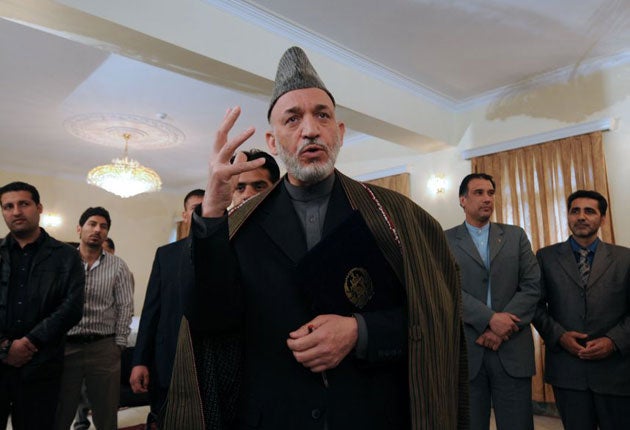Aid comes at a price for 'AfPak' leaders
Hamid Karzai and Asif Ali Zardari publicly praised President Obama's new policy for the region, but questions are already being asked about the ability of their governments to control terrorism. Andrew Buncombe and Omar Waraich report

The leaders of Afghanistan and Pakistan (now yoked together in Washington as AfPak) publicly welcomed the Obama administration's new policy for the region yesterday, but experts warned that the US and its allies faced huge challenges in achieving their aim of neutralising militancy in South Asia.
The Afghan President, Hamid Karzai, said he supported the proposal for increased civil and military aid and highlighted a plan for reaching agreements with "moderate" elements of the Taliban. The policy was "better than we were expecting," said Mr Karzai. Pakistan's leader, Asif Ali Zardari, also backed the new strategy, which will see his country receive up to $7.5bn (£5.2bn) in non-military aid, and vowed it would not be a haven for terrorists.
In a move that will be immediately welcomed by the US, Mr Zardari also sought to ease his country's political uncertainty by saying he supported the return to power of the party of a political rival in the key province of Punjab. The West has been anxious that Pakistan's leaders should not be distracted by the turmoil caused by the ousting last month of the regional government of the former prime minister Nawaz Sharif's party. Mr Zardari's announcement represents a significant climbdown; by reaffirming his commitment to democratic reforms, he has opened the way for parliament to claw back the autocratic powers he inherited from his predecessor, General Pervez Musharraf.
Yet the Obama administration's proposals are far from uncontroversial. In Afghanistan, the administration's policy of reaching compromises with Taliban elements, while welcomed by some as realistic and the best way of avoiding even more civilian casualties, will invite criticism from those who say the loss of hundreds of Western troops has been in vain. Even as the proposal was being drafted, it proved to be the most contentious of the plans.
In Pakistan, meanwhile, Mr Obama's undertaking to pursue terrorist targets "one way or another" has been seen as nothing less than a warning that the contentious use of drone missiles could be extended, possibly into Baluchistan province, which is believed to be the base of many senior militants. Such a move, which would increase anti-American feeling, would be very damaging for the civilian government. Mr Zardari yesterday repeated an undertaking that Pakistan will "not allow anyone to violate our sovereignty".
Ayesha Siddiqa, an author and military analyst, said: "At this point the Americans feel that paying off Pakistan has not helped. So it's time to use the other tactic, and raise the cost for Pakistan of non-cooperation."
What is certainly clear is that the US now considers the futures of AfPak inextricably linked in the same way that Pakistan and India used to be joined. Easing the violence in Afghanistan will be possible, Washington believes, only if it can more effectively deal with militants based inside Pakistan, close to the porous Afghan border. "We have a clear and focused goal to disrupt, dismantle and defeat al-Qa'ida in Pakistan and Afghanistan, and to prevent their return to either country in the future," Mr Obama, said on Friday.
To that end, the Obama policy will also look to Pakistan to improve conditions in the restive tribal areas, which have long complained about the lack of government investment and resources. Talat Masood, a former general turned analyst, said: "I think it's very positive. If only Pakistan will take the opportunity to take advantage of the economic aid that is now being offered. But of course it depends on how the government is able to utilise these funds. To carry out economic development, they have to be able to secure the tribal areas."
Mr Karzai, considered by his critics to be a tool of the US, has long championed the idea of reconciliation with the Taliban as a means of easing violence. The Bush administration opposed the idea, but Mr Obama acknowleged that in Afghanistan there could be no "peace without reconciliation among former enemies".
The Obama administration's willingness to negotiate with "reconcilable" elements of the Taliban represents a significant break with tradition, and perhaps a tilt towards Islamabad's thinking in the region.
After the attacks of 9/11, General Musharraf embarked on a policy of trying to wean the Taliban away from al-Qai'da. Indeed, in Pakistan several deals with militants are already in place. Last month, the government agreed an arrangement with militants who had seized control of the Swat Valley to allow the operation of courts using sharia.
Join our commenting forum
Join thought-provoking conversations, follow other Independent readers and see their replies
Comments
Bookmark popover
Removed from bookmarks